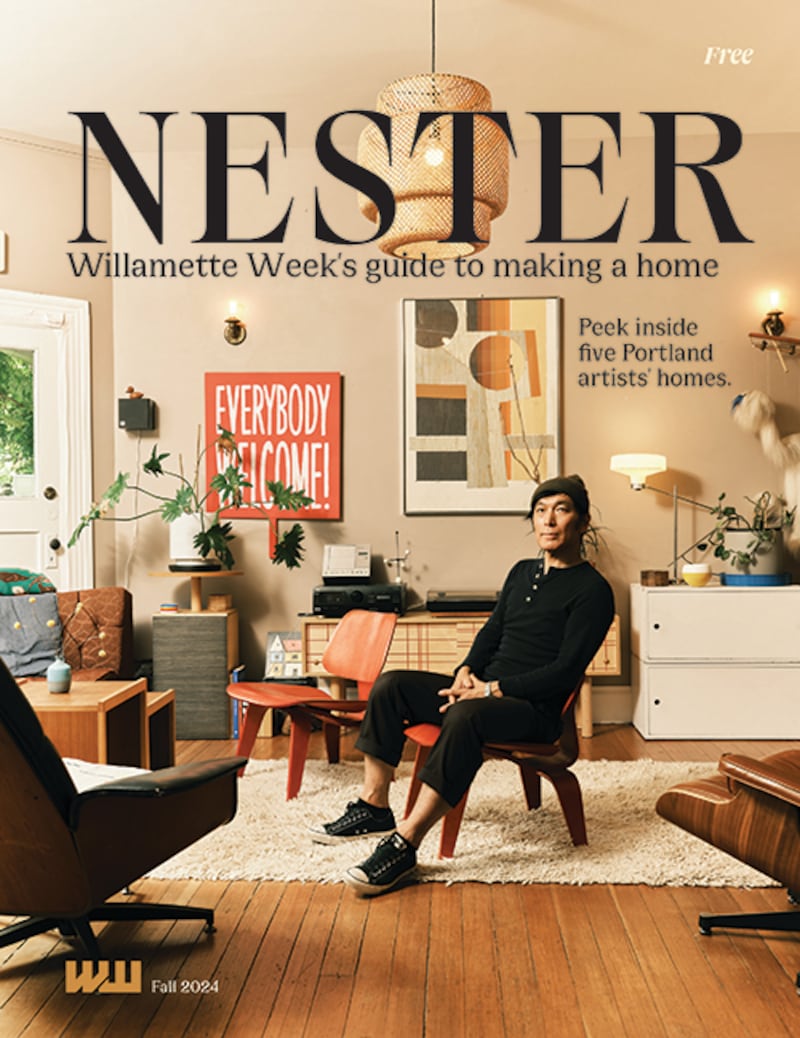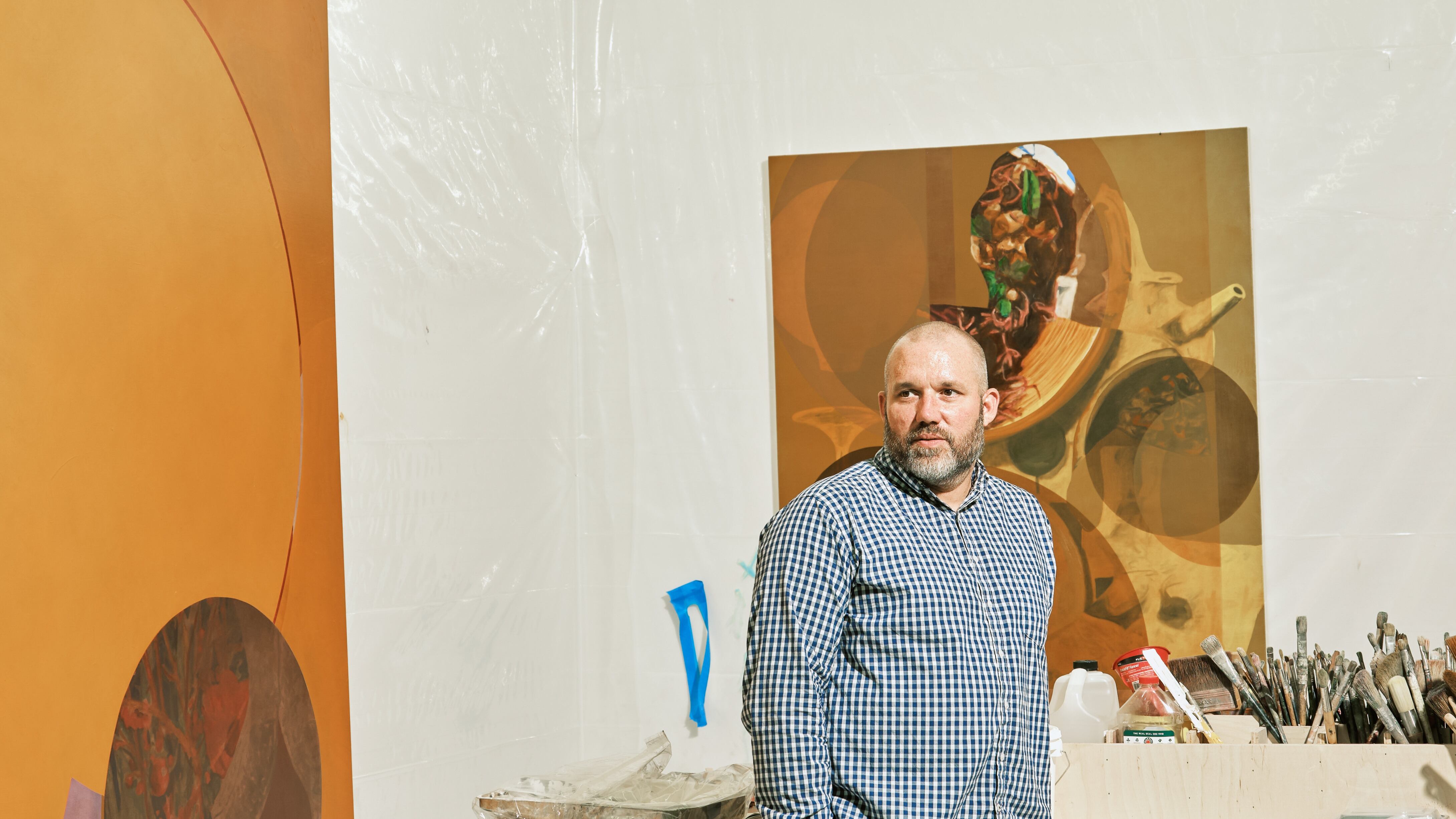When Derek Franklin switches on the lights of SE Cooper Contemporary, the small, freestanding art gallery that sits between his family home and art studio, the white walls are suddenly suffused with color. The current show of works by New York artist Jason Carey-Sheppard comprises a series of neon-bright paintings made with oil, colored pencil, ink, collage, and resin; as well as an installation of approximately 100 plaster plates cast with blue cheese. The title, fittingly, is Leckermaul—a German word denoting someone with a sweet tooth.
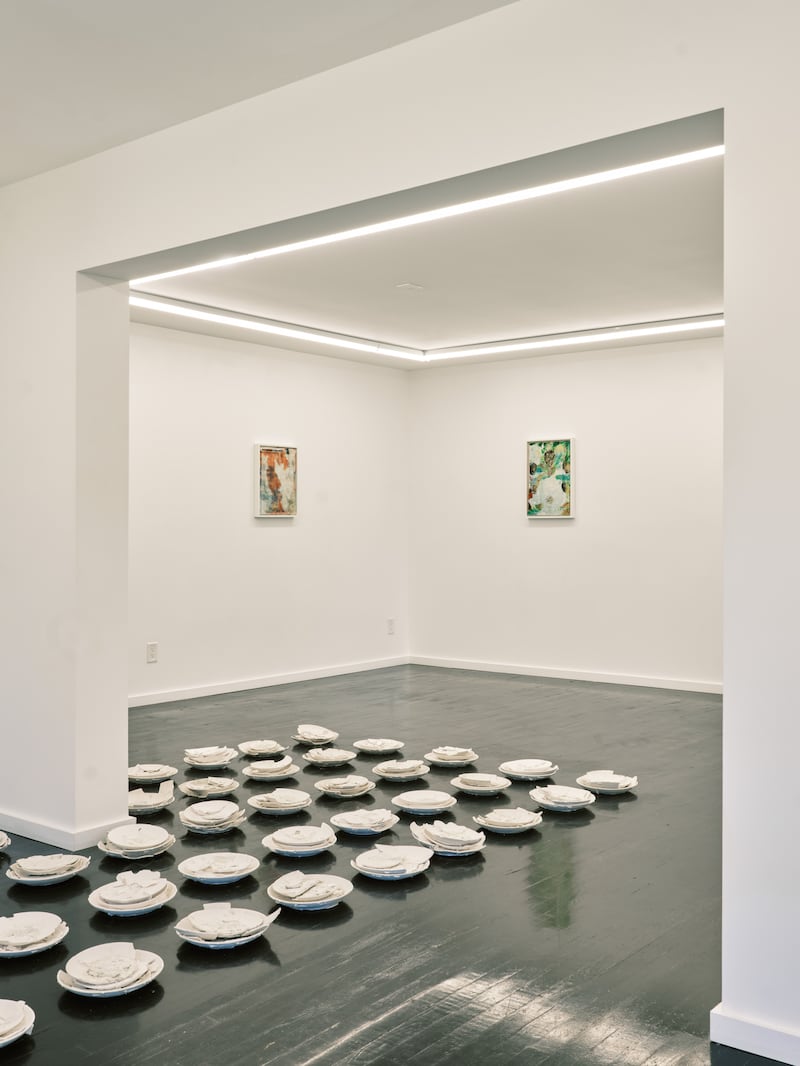
Franklin, a painter, sculptor, and director of Portland arts nonprofit Converge 45, opened the gallery in 2021 with the goal of offering working artists a kind of residential refuge from the commercial-gallery hustle. Out-of-town artists live on-site for two weeks and work alongside Franklin before mounting their shows.
The studio, gallery, and seven-bedroom home in which Franklin lives with his wife and four of their six children, sit on a grassy slope in Lents, just above the Brookside Wetland nature preserve. Two accessory dwelling units round out the property that Franklin purchased in 2016, when the buildings were part of a junkscape of broken-down cars and dilapidated structures. “There was a single-wide mobile home that you couldn’t see because it was covered by blackberries,” Franklin recalls. “I think we moved [about] 40 sheds—one was just filled with windows, another with insulation. We took four U-Hauls full of tires to the tire-recycling place.”
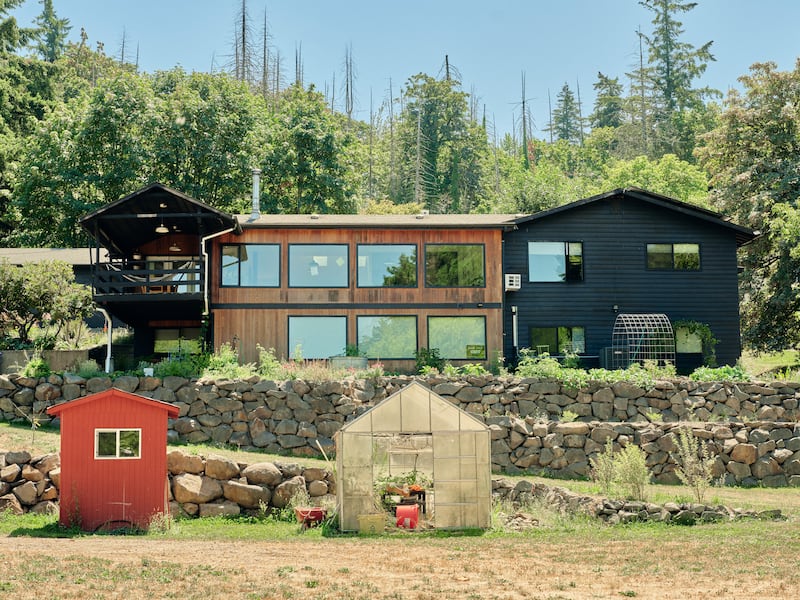
The result is a compound of clean-lined, black-sided buildings that reflects Franklin’s artistic ethos of community, transformation, and integration. Franklin, now 43, grew up in an economically depressed area of Columbia County, where he went into the sheet-metal trade after high school and began attending night classes at Portland Community College, eventually moving to Pacific Northwest College of Art, then on to a graduate program at New Jersey’s Rutgers University. After, Franklin spent several years doing what he calls “the New York thing,” showing his work at galleries, taking a curatorial internship at storied avant-garde space The Kitchen and co-directing an artist-run gallery in Brooklyn. But he and his family found themselves missing Oregon, and when he was offered a job as the chair of Marylhurst University’s art department, they moved back.
The decision to open SE Cooper Contemporary, he says, came during COVID. “I was burnt out—I had been teaching full time, and every summer, winter, spring break was [spent] fixing stuff, landscaping, cleaning. But the gallery really made me feel like I was connected here.” The groundswell of political arts activism and education at the time resonated with him as well. “I didn’t have much of a studio practice then,” he says, instead focusing on engaging with nonprofits like Don’t Shoot Portland. “It felt weird to make a painting while Trump was in office. But during COVID it was like, we should be making art—[that’s] where innovation and possibilities happen.”
Sometimes they happen inside the family residence, where a broad, central room contains kitchen, dining, and living areas and serves as a space to host organizational meetings, fundraising events, and more. Here, there’s little clutter and even less ornament. Furnishings are minimal and purpose-built: Franklin made the lacquered-wood dining table and bench seating, installed the floor-to-ceiling bookcases that line one wall and, in the kitchen area, poured the concrete tops for IKEA cabinets and an island. In a seating area with windows looking over the nature preserve, the lines between utilitarian and rarefied blur. Its wood-framed couches once lived in the library at Marylhurst; Franklin bought them when the university closed its doors in 2018, swapping out upholstery that he calls “Pendleton blankets on meth” for nubby, blue fabric. The white oval coffee table, meanwhile, was originally part of a Portland Institute for Contemporary Art installation by Japanese artist and composer Aki Onda. Art by local luminaries like sidony o’neal and PICA artistic director Kristan Kennedy hang on the house’s walls alongside drawings by Franklin’s kids, who range in age from 6 to 21.
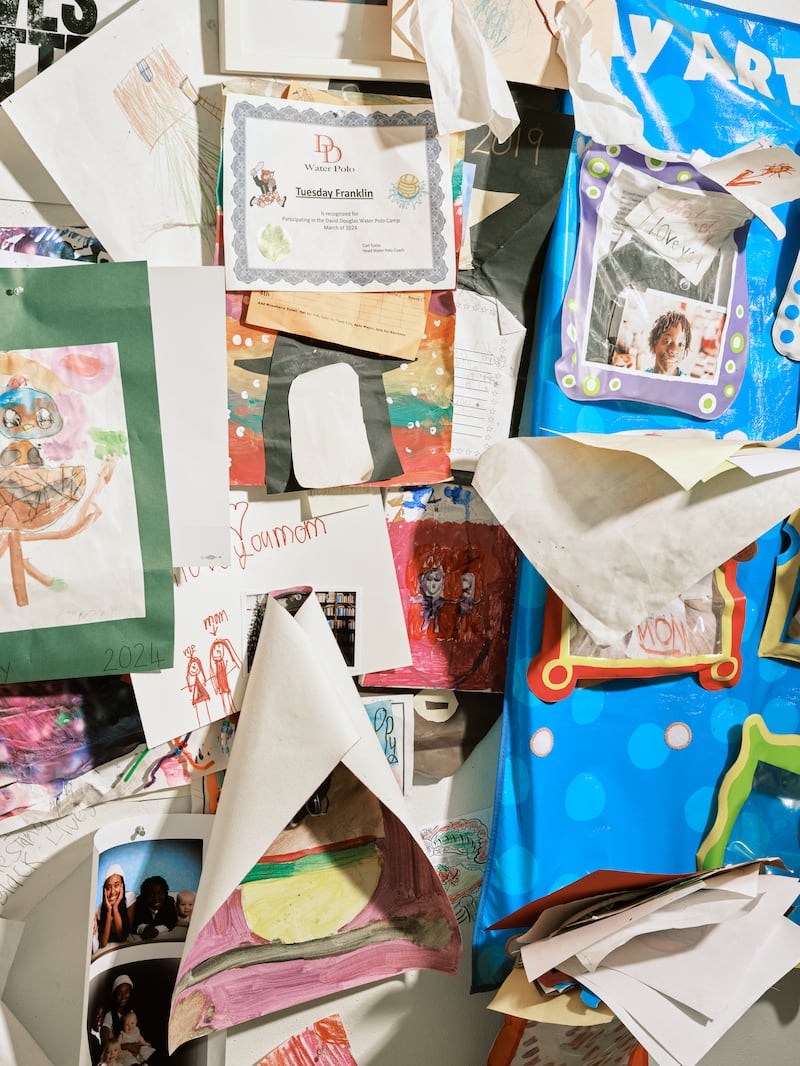
Franklin’s belief in the importance of merging art and life is equally apparent in his studio. Taped to a roll-up door are hand-drawn diagrams that set out the conceptual framework for his art practice. His paintings, sculptures, and installations are concerned with “the sets we [create], as humans, to come together to survive external forces, whether that’s worker blight and late capitalism, or direct violence.” Large, in-progress canvases are layered with motifs of flowers, food, and vessels, objects that Franklin sees as vernacular, connecting humans of the present to our ancestors, and echoing the rituals of survival that have always bonded us.
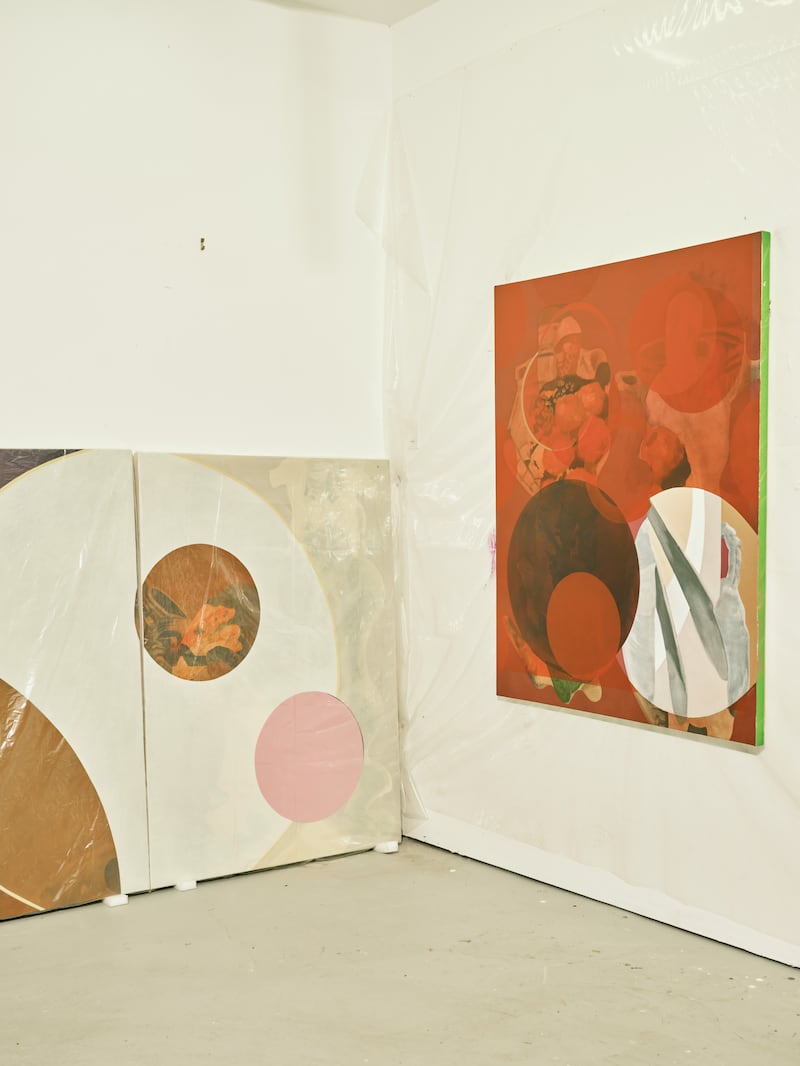
Spaces like this one have a similar purpose, Franklin believes. The gallery offers artists room outside the capital-A art world to create and network, and gives spectators a chance to see art as something that is part of life rather than a lofty, insular pursuit. It’s a place, he says, “where families with children can feel comfortable coming to view art, where they can see a show and then play on a unicorn Slip ‘N Slide—where [art] is integrated and not obscure.” Having put years of work into foregrounding connection and curiosity on this hillside, he says, “it’s really nice to share it with people.”
1 of 16
See more of Derek’s work at derekfranklin.net.
This story is part of Nester, Willamette Week’s annual home magazine. It is free and can be found all over Portland beginning Monday, Sept. 23, 2024. Find your free copy at one of the locations noted here, before they all get picked up! Or, order one through our store.
